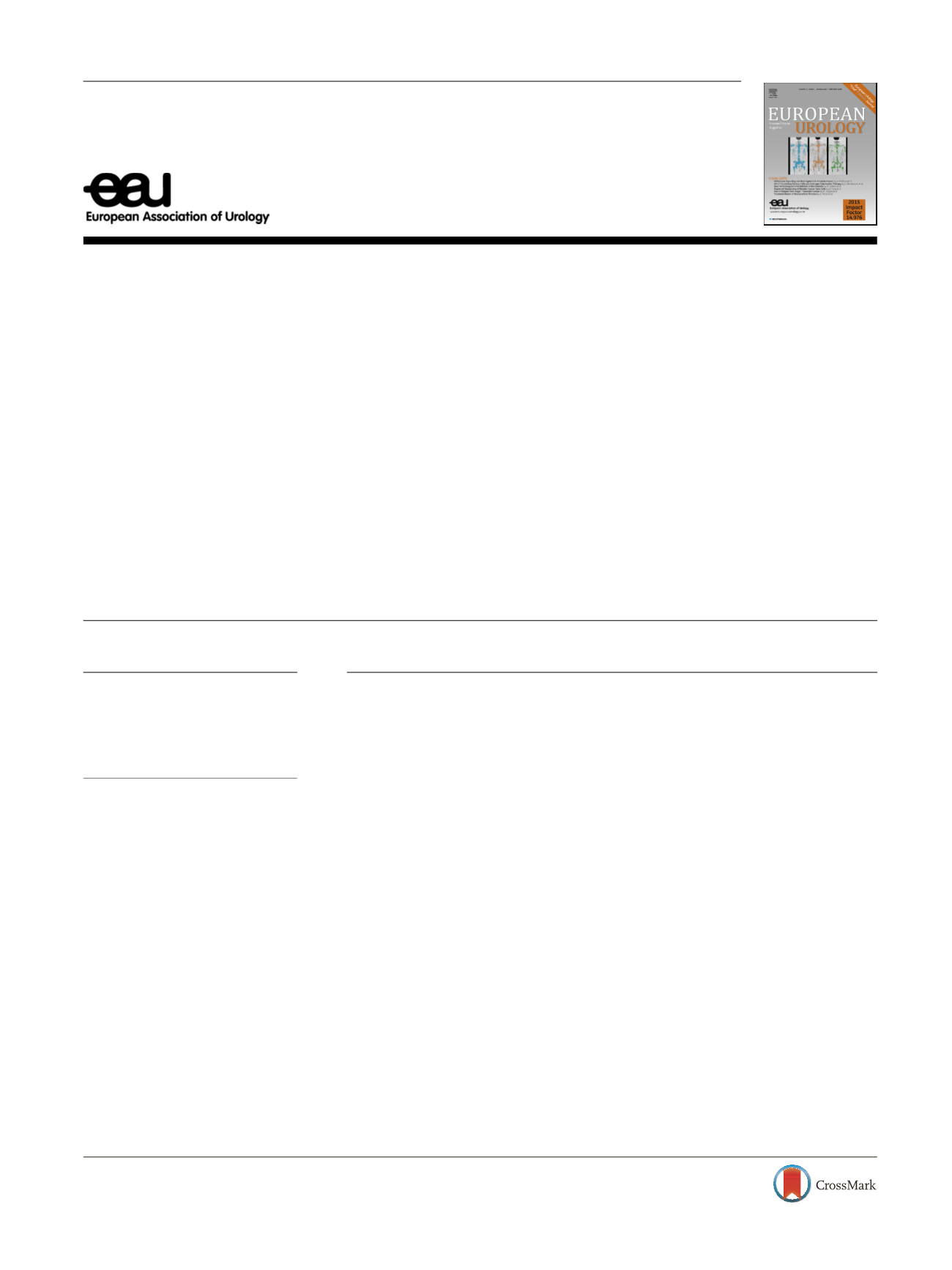

Platinum Priority – Guidelines
Editorial by James W.F. Catto, Jane M. Blazeby, Lars Holmberg, Freddie C. Hamdy and Julia Brown on
pp. 820–821 of this issue
Conflict of Evidence: Resolving Discrepancies When Findings from
Randomized Controlled Trials and Meta-analyses Disagree
Richard J. Sylvester
a , * ,Steven E. Canfield
b ,Thomas B.L. Lam
c ,Lorenzo Marconi
d ,Steven MacLennan
c ,Yuhong Yuan
e ,Graeme MacLennan
f ,John Norrie
f ,Muhammad Imran Omar
c ,Harman M. Bruins
g ,Virginia Herna´ndez
h ,Karin Plass
i ,Hendrik Van Poppel
j ,James N’Dow
ca
EAU Guidelines Office, Brussels, Belgium;
b
Division of Urology, University of Texas McGovern Medical School, Houston, TX, USA;
c
Academic Urology Unit,
University of Aberdeen, Aberdeen, UK;
d
Department of Urology, Coimbra University Hospital, Coimbra, Portugal;
e
Department of Medicine, McMaster
University, Hamilton, ON, Canada;
f
Health Services Research Unit, University of Aberdeen, Aberdeen, UK;
g
Department of Urology, Radboud University
Medical Center, Nijmegen, The Netherlands;
h
Department of Urology, Hospital Universitario Fundacion Alcorcon, Madrid, Spain;
i
EAU Central Office,
Guidelines Office, Arnhem, The Netherlands;
j
Department of Urology, University Hospital Gasthuisberg, Katholieke Universiteit Leuven, Leuven, Belgium
E U R O P E A N U R O L O G Y 7 1 ( 2 0 1 7 ) 8 1 1 – 8 1 9ava ilable at
www.sciencedirect.comjournal homepage:
www.eu ropeanurology.comArticle info
Article history:
Accepted November 16, 2016
Associate Editor:
James Catto
Keywords:
Conflict of evidence
Meta-analyses
Randomized controlled trials
Systematic reviews
Treatment guidelines
Abstract
Context:
Clinicians and treatment guideline developers are faced with a dilemma when
the results of a new, large, well-conducted randomized controlled trial (RCT) are in direct
conflict with the results of a previous systematic review (SR) and meta-analysis (MA).
Objective:
To explore and discuss possible reasons for disagreement in results from SRs/
MAs and RCTs and to provide guidance to clinicians and guideline developers for making
well-informed treatment decisions and recommendations in the face of conflicting data.
Evidence acquisition:
The advantages and limitations of RCTs and SRs/MAs are reviewed.
Two practical examples that have a direct bearing on European Association of Urology
guidelines on treatment recommendations are discussed in detail to illustrate the points
to be considered when conflicts exist between the results of large RCTs and SRs/MAs.
Evidence synthesis:
RCTs are the gold standard for providing evidence of the effective-
ness of interventions. However, concerns regarding the internal and external validity of
an RCT may limit its applicability to clinical practice. SRs/MAs synthesize all evidence
related to a given research question, but two urologic examples show that the validity of
the results depends on the quality of the individual studies, the clinical and methodo-
logical heterogeneity of the studies, and publication bias.
Conclusions:
Although SRs/MAs can provide a higher level of evidence than RCTs, the
quality of the evidence from both RCTs and SRs/MAs should be investigated when their
results conflict to determine which source provides the better evidence. Guideline
developers should have a well-defined and robust process to assess the evidence from
MAs and RCTs when such conflicts exist.
Patient summary:
We discuss the advantages and limitations of using data from
randomized controlled trials and systematic reviews/meta-analyses in informing clini-
cal practice when there are conflicting results. We provide guidance on how such
conflicts should be dealt with by guideline organizations.
#
2016 European Association of Urology. Published by Elsevier B.V. All rights reserved.
* Corresponding author. EAU Guidelines Office, 500 avenue Moliere, Brussels 1050, Belgium.
Tel. +322 346 4916.
E-mail address:
richard.sylvester@skynet.be(R.J. Sylvester).
http://dx.doi.org/10.1016/j.eururo.2016.11.0230302-2838/
#
2016 European Association of Urology. Published by Elsevier B.V. All rights reserved.
















